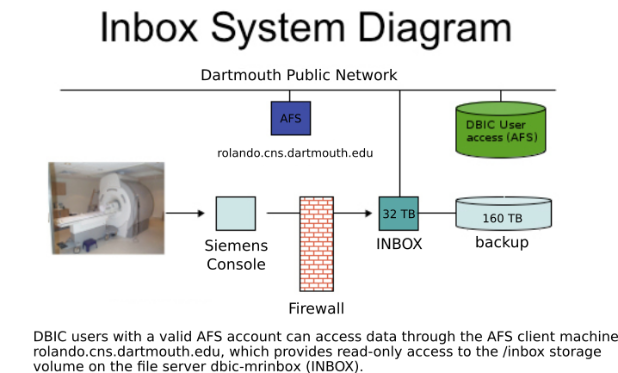Computer Resources
DBIC Systems Access
Please contact Research Computing (research.computing@dartmouth.edu) for help setting up new user accounts, accessing data, and help with existing user accounts.
Data Storage and Access
The DBIC maintains an extensible 32 Terabyte file storage server that provides persistent access to all MRI datasets collected at the center since 2008. This server runs the FreeBSD operating system with the advanced Z File System (ZFS), configured with a redundant RAIDZ-3 hard drive array. Daily snapshots ensure data integrity against accidental loss of recently stored data, and the entire system is backed up to a separate ZFS file server (with capacity of 160T), which is also updated daily. Data on the server are accessible to anyone with a DBIC user account. Instructions for getting a user account and for accessing data can be attained from Courtney Rogers (Associate Director for Operations).

Storage of DICOM images
All MRI studies collected at DBIC are stored in the DICOM format, and organized according to acquisition date and a unique accession number. Thus a study recorded on July 4, 2019 with an accession number of A00001234, can be found on the server at the location specified by: <server>:/inbox/DICOM/2019/07/04/A00001234. The DICOM files contain reconstructed MRI images obtained directly from the Siemens Console, which communicates with the file server through a dedicated private network through a firewall. The DICOMs are handled on the server side by the Java-based dcm4che (dcm4che.org) software suite.
Storage of BIDS
In addition to storage of the original DICOM images, DBIC has adopted the standard file-naming conventions specified in the Brain Imaging Data Structure (BIDS) protocol (bids.neurimaging.io) for many recently acquired studies. The BIDS format provides a convenient common framework for organizing and storing data that has been adopted widely in the neuroimaging community. The universal adoption of BIDS will enhance efforts for data sharing, reproduction of results, and promoting Open Science (http://centerforopenneuroscience.org); which are all principles that DBIC aims to promote. All investigators at DBIC have the option of transforming their data from DICOM to BIDS. For instructions, please contact Yaroslav Halchenko.
All BIDS formatted data are converted to the NIfTI Data Format (https://nifti.nimh.nih.gov) directly from the DICOM data and are stored on the same server. However, because multiple sessions (each with unique accession numbers and which may be acquired on different days) must be organized together according to Study Protocol under the BIDS specification, the organization for a particular study on the file server follows the convention: <server>:/inbox/BIDS/<PI>/<LeadInvestigator>/<StudyName>/{sid-000, ... sid-N}. Where <PI> is the name of the Principal Investigator, <LeadInvestigator> is the person responsible for the execution of the study (typically a graduate student), <StudyName> is a unique number and mnemonic shorthand for the study, and sid-XXX are unique directories for each subject in the study. For example, all data for the study number 1021 which investigated brain activity for viewing actions, run by Dr. Sam Nastase, a former graduate student of Prof. Jim Haxby is located at <server>:/inbox/BIDS/Haxby/Sam/1021_actions.
Accessing BIDS data using Datalad
To further promote data accesibility, sharing, and reproducibility, all BIDS formatted data on the DBIC server can be accessed using the DataLad file-sharing and data-versioning utility (datalad.org). DataLad makes it possible to access your data using the same version control systems developed for git and git-annex, which allows for downloading file hierarchies and meta-data, without checking file contents (such as large volumes of time-series fMRI data) into git, which would be costly in terms of storage space. Instructions on how to use DataLad can be found at https://www.datalad.org.
All MRI data at DBIC is collected following ReproIn (NIH 1P41EB019936-01A1) convention and provided to researchers as BIDS datasets under DataLad version control system (NSF CRCNS 1429999).
Suggested resource: DBIC BIDS Handbook
